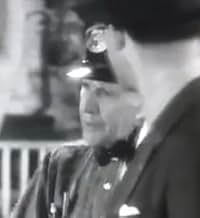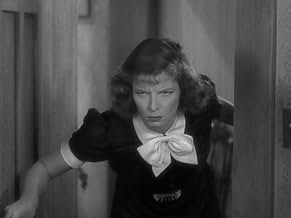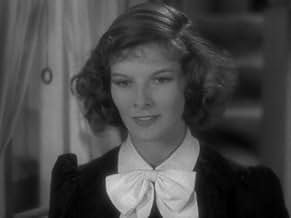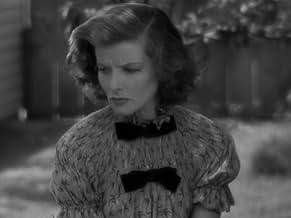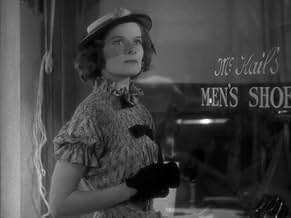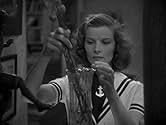NOTE IMDb
6,8/10
4,8 k
MA NOTE
Ajouter une intrigue dans votre langueA working-class girl is thwarted and embarrassed in her attempts to move up socially by her gauche family and unstable father.A working-class girl is thwarted and embarrassed in her attempts to move up socially by her gauche family and unstable father.A working-class girl is thwarted and embarrassed in her attempts to move up socially by her gauche family and unstable father.
- Réalisation
- Scénario
- Casting principal
- Nommé pour 2 Oscars
- 4 victoires et 3 nominations au total
Hattie McDaniel
- Malena
- (as Hattie McDaniels)
Brooks Benedict
- Henrietta's Dance Partner
- (non crédité)
Harry Bowen
- Laborer Putting Up Sign
- (non crédité)
Steve Carruthers
- Party Guest
- (non crédité)
Monte Carter
- Waiter at Restaurant
- (non crédité)
George Ford
- Party Guest
- (non crédité)
Joe Gilbert
- Party Guest
- (non crédité)
Avis à la une
I had literally just completed my reading of Booth Tarkington's novel from which this movie was adapted before settling down to watch Katharine Hepburn star in the title role of this early George Stevens film.
It's a little creaky for sure as you might expect from an old 1935 feature and even if it does tack on a happy ending at variance with the original book, it would take a hard heart to seriously object to the upturn in Alice and her father's fortunes as things turn out.
The story of a sparky, pretty young girl brought up in rather straitened circumstances by her well-meaning but rather down-trodden parents, she is excited to be attending a high society party in the neighbourhood where maybe she can catch the eye of a handsome, wealthy young man who will elevate her from her life of comparative drudgery and give her the good life she craves. However, forced to wear an old dress long out-of-fashion and with no friends with whom to pal about, she's reduced to taking dances from the prize klutz and then playing wall-flower before she by chance meets up with poor little rich boy Arthur Russell played by Fred McMurray, apparently the fiancé of the wealthy deb holding the party but who sees past Alice's outer appearance to the good person within and promptly falls for her.
There are side plots involving Alice's rascally brother who eventually steals money from his employer, while her old dad, played by Fred Stone, employed at the same firm, is egged on by his henpecking wife on the pretext of improving Alice's prospects, to finally get out from his sinecure and set up a glue business in competition with his erstwhile employer, the vaunted big-man-in-town A J Lamb.
It all comes to a head when mum holds a big family dinner to formally meet and greet Arthur in a painfully excruciating scene where everything that can happen to embarrass the bold Alice duly does but just when it seems that poverty and ignominy awaits the family and that Alice may have to shock-horror go out and work for a living, along come two acts separate acts of charity and compassion at the end which transform all their fortunes, especially Alice's.
It's impossible to deny Alice her happy ending, so sympathetically and engagingly does Hepburn play the part. At this early stage in her career, some of her later irritating ticks and mannerisms are largely absent so that you really want things to turn out well for her. Likewise Fred Stone as her put-upon father, who finds his backbone in the end, even if his "Dang me!" protestations in that wheedling voice of his will likely set your nerves on edge. McMurray too is charming as the suave playboy who turns his back on his privileged but mean-spirited social equals for the love of poor but honest Alice.
One thing I didn't enjoy were the stereotypical demeaning parts given to black actors in the film, like seeing Hattie McDaniels as a slatternly hired-help but to be fair they are as written in the book, although if the producer could take the liberty to change the ending, it's just a pity they couldn't have done something similar with the casting of these parts.
Still, this was an enjoyable and entertaining mild-morality tale, made memorable mainly by Hepburn's bright performance in the title role.
It's a little creaky for sure as you might expect from an old 1935 feature and even if it does tack on a happy ending at variance with the original book, it would take a hard heart to seriously object to the upturn in Alice and her father's fortunes as things turn out.
The story of a sparky, pretty young girl brought up in rather straitened circumstances by her well-meaning but rather down-trodden parents, she is excited to be attending a high society party in the neighbourhood where maybe she can catch the eye of a handsome, wealthy young man who will elevate her from her life of comparative drudgery and give her the good life she craves. However, forced to wear an old dress long out-of-fashion and with no friends with whom to pal about, she's reduced to taking dances from the prize klutz and then playing wall-flower before she by chance meets up with poor little rich boy Arthur Russell played by Fred McMurray, apparently the fiancé of the wealthy deb holding the party but who sees past Alice's outer appearance to the good person within and promptly falls for her.
There are side plots involving Alice's rascally brother who eventually steals money from his employer, while her old dad, played by Fred Stone, employed at the same firm, is egged on by his henpecking wife on the pretext of improving Alice's prospects, to finally get out from his sinecure and set up a glue business in competition with his erstwhile employer, the vaunted big-man-in-town A J Lamb.
It all comes to a head when mum holds a big family dinner to formally meet and greet Arthur in a painfully excruciating scene where everything that can happen to embarrass the bold Alice duly does but just when it seems that poverty and ignominy awaits the family and that Alice may have to shock-horror go out and work for a living, along come two acts separate acts of charity and compassion at the end which transform all their fortunes, especially Alice's.
It's impossible to deny Alice her happy ending, so sympathetically and engagingly does Hepburn play the part. At this early stage in her career, some of her later irritating ticks and mannerisms are largely absent so that you really want things to turn out well for her. Likewise Fred Stone as her put-upon father, who finds his backbone in the end, even if his "Dang me!" protestations in that wheedling voice of his will likely set your nerves on edge. McMurray too is charming as the suave playboy who turns his back on his privileged but mean-spirited social equals for the love of poor but honest Alice.
One thing I didn't enjoy were the stereotypical demeaning parts given to black actors in the film, like seeing Hattie McDaniels as a slatternly hired-help but to be fair they are as written in the book, although if the producer could take the liberty to change the ending, it's just a pity they couldn't have done something similar with the casting of these parts.
Still, this was an enjoyable and entertaining mild-morality tale, made memorable mainly by Hepburn's bright performance in the title role.
Have you ever picked up what you thought was a glass of water, but when you took a long sip you ended up with a mouthful of Sprite? A surprising feeling, but then you have to figure out if it's pleasant or not. I felt similarly about my experience watching "Alice Adams", George Stevens' 1935 film starring Katherine Hepburn as the title character. Expecting a wily romantic comedy, possibly a precursor to Hepburn's screwball comedies, I instead witnessed a beautiful, touching and sad film about rejection and romance in small-town America.
Alice is the daughter of a bookkeeper who is sick, and therefore temporarily out of work. Even before his unemployment, his job did not provide as much money for his family as many of Alice's contemporaries. This causes Alice to not be accepted in society, and makes it harder to find a boyfriend, though she tries to keep cheerful in front of her family. Unfortunately Mrs. Adams doesn't make things easier, by constantly harping on Mr. Adams to quit his job and be more ambitious. When the Palmers have their annual dance, Alice asks her brother Walter to take her, and there she first sees Arthur Russell MacMurray) a wealthy young man who is practically engaged to Mildred Palmer, probably the richest and most socially prominent young woman in the town. He notices Alice, and after a dance together, finds her a couple of days later and they begin a romance, but it becomes obvious that Alice is not going to be able to put up a façade of wealth and social acceptance for long, as their relationship becomes more serious.
There were so many times that I found myself just aching for Alice during this film. Booth Tarkington is so good at capturing the darker side of small town life without being obvious, that it is understandable that this film could be mistaken for a light romantic comedy, though in reality it was anything but. Alice's low self-esteem, mainly due to society's views on her more than her family's lack of money makes her such a fragile character that she becomes immediately sympathetic, and this is mainly due to Hepburn's performance. This was early in her career, and after seeing many of her later films it is easy to forget just how radiant and luminous she once was. She has always been one of my favorite actresses, but it was generally because of the strength she gave the characters she played throughout the years, not her fragility. "Alice Adams" was an extremely pleasant surprise, and I ended up absolutely loving it. A very solid 8/10.
--Shelly
Alice is the daughter of a bookkeeper who is sick, and therefore temporarily out of work. Even before his unemployment, his job did not provide as much money for his family as many of Alice's contemporaries. This causes Alice to not be accepted in society, and makes it harder to find a boyfriend, though she tries to keep cheerful in front of her family. Unfortunately Mrs. Adams doesn't make things easier, by constantly harping on Mr. Adams to quit his job and be more ambitious. When the Palmers have their annual dance, Alice asks her brother Walter to take her, and there she first sees Arthur Russell MacMurray) a wealthy young man who is practically engaged to Mildred Palmer, probably the richest and most socially prominent young woman in the town. He notices Alice, and after a dance together, finds her a couple of days later and they begin a romance, but it becomes obvious that Alice is not going to be able to put up a façade of wealth and social acceptance for long, as their relationship becomes more serious.
There were so many times that I found myself just aching for Alice during this film. Booth Tarkington is so good at capturing the darker side of small town life without being obvious, that it is understandable that this film could be mistaken for a light romantic comedy, though in reality it was anything but. Alice's low self-esteem, mainly due to society's views on her more than her family's lack of money makes her such a fragile character that she becomes immediately sympathetic, and this is mainly due to Hepburn's performance. This was early in her career, and after seeing many of her later films it is easy to forget just how radiant and luminous she once was. She has always been one of my favorite actresses, but it was generally because of the strength she gave the characters she played throughout the years, not her fragility. "Alice Adams" was an extremely pleasant surprise, and I ended up absolutely loving it. A very solid 8/10.
--Shelly
When I first watched this film, despite the fact that George Steven's excellent direction makes a rather mundane plot into a very involving film, I was a bit thrown off by the actor who plays Katherine Hepburn's ailing father. About midway through the film I thought: "this guy's not much of an actor...".
However, by the time the film was over, I was completely captivated by the man, mostly due to his big confrontation scene with his boss near the end--in fact, I think I re-played that scene five times to really appreciate it's emotional power. And it is because of Mr. Fred Stone's performance in that scene that "Alice Adams" remains one of my very favorite films.
And who was the man? Well, anyone viewing "Alice Adams" is watching a rare document of American theatrical history. Fred Stone was born in 1873, actually traveled west with his family in a covered wagon, became a circus performer, acrobat, dancer, clown and expert "eccentric dancer." He knew Will Rogers and Annie Oakley, and became a MAJOR musical theater star in the early 20th-century. His most famous role was that of the ORIGINAL SCARECROW in the very first (1902) stage version of the WIZARD of OZ. As a young man Ray Bolger saw the production in Boston, and began to pursue his own "eccentric dancing" career, becoming immortalized himself as the Scarecrow in the 1939 MGM film.
In "Alice Adams", Fred Stone gives a remarkably sympathetic and honest performance, a simple, rather shy and utterly unpretentious Everyman, who, though convalescing from some undisclosed illness, must constantly endure the brow-beatings and guilt trips laid upon him by his nagging wife. By the end of the film, having become entangled in a business venture for which he seems totally unqualified and outraged by his son's thievery, he confronts his own boss in his living room for his big emotional scene. I remember reading in Mr. Stone's autobiography that George Stevens and Katherine Hepburn were so impressed by his performance in this scene that they actually EXPANDED his part in it to give him more screen time.
After Katherine Hepburn steps in to smooth things over with the boss, she has a final tender scene with Mr. Stone, one of those achingly beautiful scenes (with a lovely background score) that brings tears to the eye because of its sincerity and simplicity. You won't find anything like it in any film of the last 40 years--many imitations, yes---but not the REAL thing.
Oh yes, there's Katherine Hepburn too, in a role that requires her to act flighty and charming in an annoyingly overwrought way---a little of it goes a VERY long way. Still, she's lovely. Other stand-outs include Alice's smart-aleck brother, played by Frank Albertson, an appealing light comedy/musical theater guy BEST KNOWN for 2 roles: as Sam "hee-haw" Wainwright in "It's a Wonderful Life" and as the lecherous businessman who gives Janet Leigh the $40,000 in the second scene of "Psycho" (he really had aged a lot by 1959). Also, Charley Grapewin, best-known as Uncle Henry in the 1939 "Wizard of OZ" has a chance to shine as Mr. Stone's slightly cantankerous but generous and warm-hearted boss, Mr. Lamb.
"Alice Adams" is not for everyone; it's a low-key, genteel film about the problems of small-town people who are moving up in the social world and the one family that gets left behind. But thanks to George Steven's sensitive and compelling direction, the film transcends it very earthbound plot and becomes, at least for some of us, a very involving cinematic treasure.
However, by the time the film was over, I was completely captivated by the man, mostly due to his big confrontation scene with his boss near the end--in fact, I think I re-played that scene five times to really appreciate it's emotional power. And it is because of Mr. Fred Stone's performance in that scene that "Alice Adams" remains one of my very favorite films.
And who was the man? Well, anyone viewing "Alice Adams" is watching a rare document of American theatrical history. Fred Stone was born in 1873, actually traveled west with his family in a covered wagon, became a circus performer, acrobat, dancer, clown and expert "eccentric dancer." He knew Will Rogers and Annie Oakley, and became a MAJOR musical theater star in the early 20th-century. His most famous role was that of the ORIGINAL SCARECROW in the very first (1902) stage version of the WIZARD of OZ. As a young man Ray Bolger saw the production in Boston, and began to pursue his own "eccentric dancing" career, becoming immortalized himself as the Scarecrow in the 1939 MGM film.
In "Alice Adams", Fred Stone gives a remarkably sympathetic and honest performance, a simple, rather shy and utterly unpretentious Everyman, who, though convalescing from some undisclosed illness, must constantly endure the brow-beatings and guilt trips laid upon him by his nagging wife. By the end of the film, having become entangled in a business venture for which he seems totally unqualified and outraged by his son's thievery, he confronts his own boss in his living room for his big emotional scene. I remember reading in Mr. Stone's autobiography that George Stevens and Katherine Hepburn were so impressed by his performance in this scene that they actually EXPANDED his part in it to give him more screen time.
After Katherine Hepburn steps in to smooth things over with the boss, she has a final tender scene with Mr. Stone, one of those achingly beautiful scenes (with a lovely background score) that brings tears to the eye because of its sincerity and simplicity. You won't find anything like it in any film of the last 40 years--many imitations, yes---but not the REAL thing.
Oh yes, there's Katherine Hepburn too, in a role that requires her to act flighty and charming in an annoyingly overwrought way---a little of it goes a VERY long way. Still, she's lovely. Other stand-outs include Alice's smart-aleck brother, played by Frank Albertson, an appealing light comedy/musical theater guy BEST KNOWN for 2 roles: as Sam "hee-haw" Wainwright in "It's a Wonderful Life" and as the lecherous businessman who gives Janet Leigh the $40,000 in the second scene of "Psycho" (he really had aged a lot by 1959). Also, Charley Grapewin, best-known as Uncle Henry in the 1939 "Wizard of OZ" has a chance to shine as Mr. Stone's slightly cantankerous but generous and warm-hearted boss, Mr. Lamb.
"Alice Adams" is not for everyone; it's a low-key, genteel film about the problems of small-town people who are moving up in the social world and the one family that gets left behind. But thanks to George Steven's sensitive and compelling direction, the film transcends it very earthbound plot and becomes, at least for some of us, a very involving cinematic treasure.
ALICE ADAMS, played by the late, great Katharine Hepburn, is quintessentially the beautiful, ambitious small-town girl put upon by circumstance. She wants desperately to be accepted, to be something other than just a poor "nobody"... to hide the fact that she doesn't come from 'money' and 'background'. This is painfully obvious in the first few scenes, when Alice steals out of the nickel-and-dime store but pauses meaningfully before the classy Vogue shopfront: trying to fool the world and possibly herself into thinking that that was where she was shopping all afternoon. She plans and preens for the high-society Palmer party, even though she has to wear her two-year-old dress, pick flowers for her own corsage, and go with her brother Walter (Frank Albertson) as her date. As everyone at the party ignores Alice, save another social reject Frank Dowling (bit-player Grady Sutton), she spots and is attracted to the rich, handsome Arthur Russell (Fred MacMurray, in a woefully underwritten role). Of course, Mr. Russell is meant to marry party hostess Mildred Palmer. This doesn't last long though--he quickly makes clear his attraction to the magnetic, gracefully awkward Alice, and begins to court her with serious intent. But Alice, in her eagerness to hide her social status, papers over their growing love with lies, which leads to a disastrous dinner party at the Adams abode... even as her family slowly disintegrates around them, partly due to Alice's father Virgil (Fred Stone) wanting to earn more money for his daughter.
The film is generally okay--that's the best word for it. Not great, not even really *good*, but just... okay. It's interesting, and hints at something better than it is. But ultimately, it's a social drama that comes off a bit stilted, with very few fully-fledged characters. The key role of Arthur Russell is remarkably free of a personality, and it's even hard to really put a finger on what Arthur finds so enchanting about Alice... aside from her being fortuitously Katharine Hepburn's identical twin. Oh, Alice is an interesting character, certainly. But so much of her being is concentrated on her social ambitions that it leaves you wondering what Arthur sees in her since these are the very things she hides from him when they are together. Alice's brother and father fare better, but even towards the end, Walter becomes little more than a plot device in an ending that appears to want to serve as a muddled sort of come-uppance for Alice. Sutton as bumbling gentleman and his sister's dance partner is actually a stand-out in his... what? Five minutes of screen time? Intriguing though the message of the film may be (social class does not matter and attempts to rise above it will only keep you from your true self and happiness), the blandness of the characters keeps one from really developing sympathy for the characters.
As for Alice, the film almost seems designed to have the audience keep her at arm's length. When she recognises that she is the one who will drive Arthur away, not because of what he has heard about her but because she cannot bear to confront her own reality head on, she keeps pressing on. The one truly brilliant scene in the film is that of the disastrous dinner party--this is possibly the first film I've seen where the atmosphere is one of muffled horror, both on the part of the participants as well as the audience. As Alice flounders through the dinner, chatting constantly, gaily, desperately, I found myself just wanting her to please, please keep quiet. To stop making things worse. It was very effectively staged, and a wry, clever commentary on Alice's inability to just relax and be herself. But by the end of the film, when Alice realises her foolishness and finally lets her guard down, there just isn't time to muster much sympathy for her character. It doesn't help that her suitor is so terminally boring that the love story is charming at best, but certainly does not come anywhere near to the unadulterated magic of the best classic film couples.
However--and this is a pretty darn big however--although this is probably not one of Hepburn's better 1930s films (she starred in a whole run of those, including LITTLE WOMEN, STAGE DOOR, HOLIDAY and BRINGING UP BABY), this is without a doubt one of the best of her 1930s performances. Never was there a lovelier, more quietly desperate wallflower than Hepburn's Alice. Hepburn is not squarely in her prime here--not yet. For that, I point you to her unparalleled, radiant turn in THE PHILADELPHIA STORY. But in ALICE ADAMS, she is all fresh, awkward beauty. Her performance gives a strong hint of what she will be well capable of in the future--an almost intuitive ability to harness those 'mannerisms' of hers, as her critics call them, to serve the performance and flesh out her character... but also to shed them in an instant and truly, genuinely surprise her audience with beautiful understatement and a remarkable lack of histrionics in her performance. (This would only be refined in her future roles with Spencer Tracy.) As Alice floats through the Palmer party, pretending she is in demand and only waiting for her date, or as she chats with a desperate light in her eyes to Arthur at the Adams' dinner party, Hepburn suffuses the role with the kind of quiet, frantic desire which is simply perfect for her character. It is Hepburn that gives ALICE ADAMS the spark of life it needs to keep from being a mediocre, even bad, film. Her performance is the cornerstone and, quite frankly, the most interesting part of the film.
7.5, largely on the basis of Hepburn's performance which gives this film the extra edge it needs.
The film is generally okay--that's the best word for it. Not great, not even really *good*, but just... okay. It's interesting, and hints at something better than it is. But ultimately, it's a social drama that comes off a bit stilted, with very few fully-fledged characters. The key role of Arthur Russell is remarkably free of a personality, and it's even hard to really put a finger on what Arthur finds so enchanting about Alice... aside from her being fortuitously Katharine Hepburn's identical twin. Oh, Alice is an interesting character, certainly. But so much of her being is concentrated on her social ambitions that it leaves you wondering what Arthur sees in her since these are the very things she hides from him when they are together. Alice's brother and father fare better, but even towards the end, Walter becomes little more than a plot device in an ending that appears to want to serve as a muddled sort of come-uppance for Alice. Sutton as bumbling gentleman and his sister's dance partner is actually a stand-out in his... what? Five minutes of screen time? Intriguing though the message of the film may be (social class does not matter and attempts to rise above it will only keep you from your true self and happiness), the blandness of the characters keeps one from really developing sympathy for the characters.
As for Alice, the film almost seems designed to have the audience keep her at arm's length. When she recognises that she is the one who will drive Arthur away, not because of what he has heard about her but because she cannot bear to confront her own reality head on, she keeps pressing on. The one truly brilliant scene in the film is that of the disastrous dinner party--this is possibly the first film I've seen where the atmosphere is one of muffled horror, both on the part of the participants as well as the audience. As Alice flounders through the dinner, chatting constantly, gaily, desperately, I found myself just wanting her to please, please keep quiet. To stop making things worse. It was very effectively staged, and a wry, clever commentary on Alice's inability to just relax and be herself. But by the end of the film, when Alice realises her foolishness and finally lets her guard down, there just isn't time to muster much sympathy for her character. It doesn't help that her suitor is so terminally boring that the love story is charming at best, but certainly does not come anywhere near to the unadulterated magic of the best classic film couples.
However--and this is a pretty darn big however--although this is probably not one of Hepburn's better 1930s films (she starred in a whole run of those, including LITTLE WOMEN, STAGE DOOR, HOLIDAY and BRINGING UP BABY), this is without a doubt one of the best of her 1930s performances. Never was there a lovelier, more quietly desperate wallflower than Hepburn's Alice. Hepburn is not squarely in her prime here--not yet. For that, I point you to her unparalleled, radiant turn in THE PHILADELPHIA STORY. But in ALICE ADAMS, she is all fresh, awkward beauty. Her performance gives a strong hint of what she will be well capable of in the future--an almost intuitive ability to harness those 'mannerisms' of hers, as her critics call them, to serve the performance and flesh out her character... but also to shed them in an instant and truly, genuinely surprise her audience with beautiful understatement and a remarkable lack of histrionics in her performance. (This would only be refined in her future roles with Spencer Tracy.) As Alice floats through the Palmer party, pretending she is in demand and only waiting for her date, or as she chats with a desperate light in her eyes to Arthur at the Adams' dinner party, Hepburn suffuses the role with the kind of quiet, frantic desire which is simply perfect for her character. It is Hepburn that gives ALICE ADAMS the spark of life it needs to keep from being a mediocre, even bad, film. Her performance is the cornerstone and, quite frankly, the most interesting part of the film.
7.5, largely on the basis of Hepburn's performance which gives this film the extra edge it needs.
I am NOT a fan of Katharine Hepburn....but I really like her in this film. I don't think she ever looked cuter and was more appealing. One often forgets the fresh face and beauty she had when she was young.
This film starts off wonderfully for 20 minutes, then bogs down a bit for an hour and then rallies brilliantly in the last 20 minutes. That last part is so good that made the film not only worthwhile to view but one to keep and watch every few years.
It bogs down when Hepburn starts her deceiving scheme and nervously yaks and yaks and yaks trying to impress her boyfriend (Fred MacMurray). The deceit involves her trying to hide her social status, something that must have meant a lot more back in the early '30s than it does today.
Critics comment about how the dinner scene is a "classic" and the highlight of the film, but I didn't think it was all that great, although Hattie McDaniel is funny. It's what happened afterward that made it a memorable film to me.
Although Hepburn and Fred MacMurray are the stars of this romance-comedy, Fred Stone almost steals the show. Playing Hepburn's dad in the film, he was both hilarious at times and very sad....and always interesting. He gives an unbelievably powerful speech to his boss near the end of this film.
Another plus for "Alice Adams" is the direction. This is early George Stevens, but just about any film that man directed is top-notch, including this one.
Without giving away what happens in the story, the film does present a nice message of forgiveness and reconciliation and sports one of the stronger feel-good endings I've ever seen on film. Hepburn's last words in the movie are "Gee Whiz!!" That bygone innocent reaction to MacMurray's comment that he loved her says a lot about how movies and times have changed.
This film starts off wonderfully for 20 minutes, then bogs down a bit for an hour and then rallies brilliantly in the last 20 minutes. That last part is so good that made the film not only worthwhile to view but one to keep and watch every few years.
It bogs down when Hepburn starts her deceiving scheme and nervously yaks and yaks and yaks trying to impress her boyfriend (Fred MacMurray). The deceit involves her trying to hide her social status, something that must have meant a lot more back in the early '30s than it does today.
Critics comment about how the dinner scene is a "classic" and the highlight of the film, but I didn't think it was all that great, although Hattie McDaniel is funny. It's what happened afterward that made it a memorable film to me.
Although Hepburn and Fred MacMurray are the stars of this romance-comedy, Fred Stone almost steals the show. Playing Hepburn's dad in the film, he was both hilarious at times and very sad....and always interesting. He gives an unbelievably powerful speech to his boss near the end of this film.
Another plus for "Alice Adams" is the direction. This is early George Stevens, but just about any film that man directed is top-notch, including this one.
Without giving away what happens in the story, the film does present a nice message of forgiveness and reconciliation and sports one of the stronger feel-good endings I've ever seen on film. Hepburn's last words in the movie are "Gee Whiz!!" That bygone innocent reaction to MacMurray's comment that he loved her says a lot about how movies and times have changed.
Le saviez-vous
- AnecdotesThough Bette Davis won the 1935 Academy Award/Oscar for L'Intruse (1935) beating out Katharine Hepburn in Désirs secrets (1935), Davis was noted for saying more than once that she didn't deserve the award that year and that the one who did was Katharine Hepburn.
- GaffesWhen Alice walks with Arthur toward her house for the first time, a woman watering her shrubs can be seen and a letter carrier walks up, then back down her porch steps twice. The background scene repeats itself, letter carrier, woman setting down hose, etc. The letter carrier approaches Alice moments later where she then has to shamefully admit to Arthur that this is, indeed, her house that she is in front of. Likely a rear projection scene that was duplicated.
- Citations
Mrs. Adams: Malena fell down the cellar stairs!
Virgil Adams: Did she break any of our things?
- ConnexionsFeatured in George Stevens: A Filmmaker's Journey (1984)
Meilleurs choix
Connectez-vous pour évaluer et suivre la liste de favoris afin de recevoir des recommandations personnalisées
Détails
- Date de sortie
- Pays d’origine
- Langue
- Aussi connu sous le nom de
- Alice Adams
- Lieux de tournage
- Société de production
- Voir plus de crédits d'entreprise sur IMDbPro
- Durée
- 1h 39min(99 min)
- Couleur
- Rapport de forme
- 1.37 : 1
Contribuer à cette page
Suggérer une modification ou ajouter du contenu manquant


